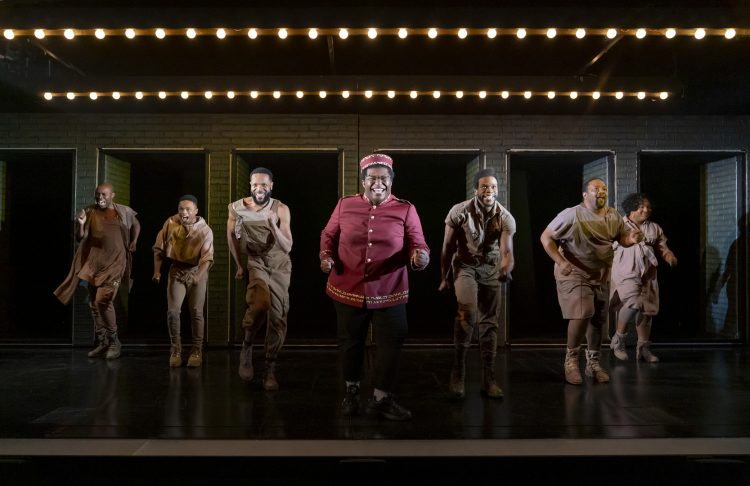…but the musical numbers are so expansive, inventive, subversive, so side-splittingly funny that one quickly catches one’s breath. This is, after all, a musical, and as a musical, Michael R. Jackson’s A Strange Loop triumphs. The audience leaps to its feet as Larry Owens’s Usher fittingly ends the endlessly self-referential play with its title, popping the final ‘p’ to punctuate the joke of ending the play with its title.
And Owens is remarkable. Whether indulging his ‘inner white girl’, performing a madcap mashup of Tyler Perry stereotypes, simulating sodomy with Antwayn Hopper’s overtly racist meth-head or belting out gospel in ‘AIDS is God’s Punishment’, an elaborately staged piece of anti-anti-gay propaganda that had many in the audience clapping along, Owens remains fiercely committed to the play’s overarching goal of making us sympathise with Usher, a character defined—at least in dramatic terms—less by race, weight and sexual orientation than by chronic passivity and self-absorption.
Ostensibly set in the interval of a performance of The Lion King, where Usher serves as, yes, an usher, A Strange Loop confronts the reluctant service employee and aspiring writer with a gallery of nagging ‘Thoughts’ brought to life by a cast so gifted as to frequently burst the bonds of their subordinate roles. This is especially the case with Usher’s mother and father, who achieve three-dimensional existence outside Usher’s mind on several occasions in the hands of several talented actors. Stand-out vignettes include Antwayn Hopper as a grindr date, John-Michael Lyles as Usher’s little brother, Jason Veasey as his deeply conflicted father and John-Andrew Morrison as his doting and controlling mother.

But perhaps it’s unjust to single out any one performer in a show so expert in character and gender fluidity—a skill which, by the way, is at once the play’s greatest strength and weakness. For as an inexhaustible source of laughs and surprises it permits the playwright to avoid the more difficult and dangerous task of creating characters who not only prod Usher from within, but actually challenge him from without—as human beings in their own right with back stories and nagging thoughts of their own that invite his and the audience’s identification.
This solipsistic tendency is nowhere more evident than in Usher’s rant to his parents, in which athletic black men who prefer white men to him are accused of social ambition, an argument disturbingly reminiscent of an online screed by a heterosexual ‘incel’. Yet so complete is Usher’s command of the audience’s sympathies by this point that the rant earns rousing applause.
Now one may certainly argue that solipsism is the point. Even the name Usher may be less a nod to the character’s job than a reference to Poe’s short story about a house brought down by incest, that is, by a refusal to engage with the outside world. If so, Jackson clearly sees Usher’s problem. In a telling moment, a Thought protests his parents’ depiction as stereotypes. “But is that really what real life is like with them?”, she asks, to which Usher replies, “Maybe not, but that’s what it feels like”.

Fair enough for a character sharing his feelings or an author writing a one man show. But for a playwright working with a cast of seven, some level of identification is called for—whether the other be a manipulative parent, a bigoted pastor, or a horny racist on meth. Otherwise the very purpose of writing a play is undermined. For how does Usher get out of his head if all he writes is what he feels? And what do we the audience really learn about Usher if we only see him in situations where he suffers as a passive victim? Action defines character, and at no point does Usher take any decisive action save to write a play in which he takes no decisive action save to write a play in which he takes no decisive action…
Don’t misunderstand me. This show is well worth the ticket price. If I criticise the foundations, it’s only in view of the heights to which Jackson’s play has already risen. And his success is well-deserved. His dialogue crackles. His pacing never falters. The world of the play feels constrictingly narrow at times, but the musical numbers are so expansive, inventive, subversive, so side-splittingly funny that one quickly catches one’s breath. This is, after all, a musical, and as a musical, Michael R. Jackson’s A Strange Loop triumphs.
A Strange Loop, produced by Playwrights Horizons in association with Page 73, is running at Playwrights Horizons through July 28th. For more information visit www.playwrightshorizons.org

